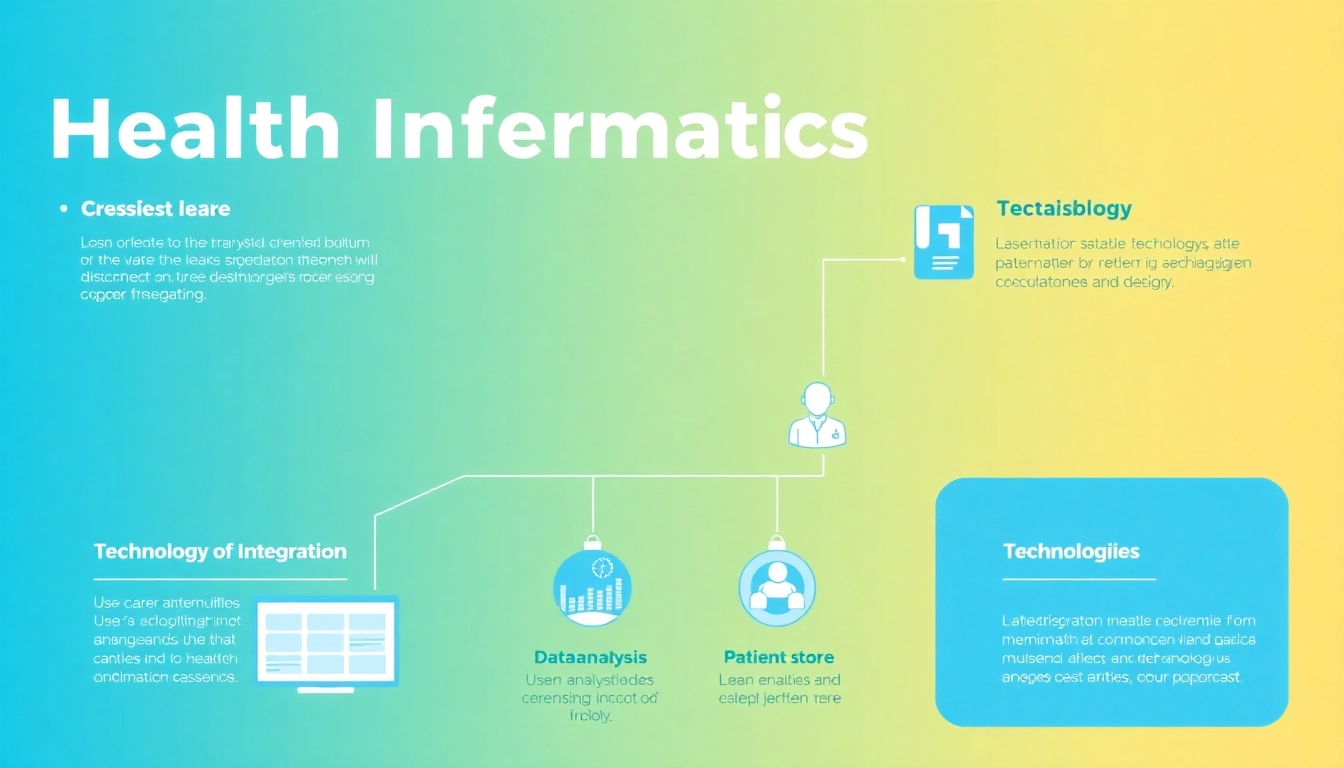Introduction to Health Informatics
In today’s fast-paced healthcare environment, the integration of technology and information systems has become crucial for improving patient care and clinical outcomes. Health informatics, a multidisciplinary field, plays a pivotal role in enhancing the efficiency and effectiveness of healthcare services. By combining data science, information technology, and healthcare processes, informatics professionals focus on utilizing data to optimize patient care and streamline organizational workflows. For those seeking in-depth information on this crucial topic, the resources available at www.informaticsview.com provide valuable insights.
Defining Health Informatics
Health informatics is the science of how to collect, store, manage, and use health data. It encompasses a variety of concepts including Electronic Health Records (EHR), telehealth, and clinical decision support systems. Essentially, health informatics is about making information work for healthcare, enabling practitioners to provide better health outcomes by leveraging data more effectively.
The Role of Technology in Healthcare
Technology has profoundly transformed healthcare, from how patients access care to how providers deliver it. The integration of IT solutions like EHRs allows for seamless data sharing among healthcare professionals, improving the accuracy of diagnoses and treatments. Additionally, advancements in telemedicine and mobile health (mHealth) applications empower patients to engage actively in their health management.
Overview of Informatics Disciplines
Health informatics is comprised of several disciplines, including:
- Clinical Informatics: Focuses on the use of data in patient care settings.
- Nursing Informatics: Integrates nursing science, computer science, and information science to enhance patient care and healthcare outcomes.
- Public Health Informatics: Applies informatics principles to improve public health systems and methodologies.
- Bioinformatics: Utilizes computer technology in the field of biology, particularly in genomics and molecular biology.
Importance of Data in Healthcare
Data serves as the bedrock of health informatics, influencing every facet of healthcare delivery. Effective management and utilization of data lead to improved patient outcomes, more efficient healthcare systems, and enhanced decision-making processes.
Data Collection and Management
Data collection in healthcare settings involves gathering both clinical and operational data. This data must be managed effectively to ensure its integrity and usability. Advanced database management systems and data warehouses play critical roles in this process, allowing healthcare organizations to store vast quantities of information while maintaining strict security and compliance standards.
Impact on Patient Outcomes
Improved data utilization has a direct correlation with enhanced patient care outcomes. For example, clinical decision support systems that rely on data analytics can assist healthcare providers in making evidence-based decisions tailored to individual patient needs. This not only improves the standard of care but also reduces the likelihood of medical errors.
Challenges in Data Utilization
Despite the advantages of data-driven healthcare, significant challenges persist. Data silos, lack of standardization across systems, and privacy concerns hinder effective data sharing. Addressing these challenges is essential to fully leverage the benefits of health informatics.
Applications of Health Informatics
Health informatics underpins several key applications that facilitate enhanced care delivery and operational efficiency.
Electronic Health Records (EHR)
EHR systems are foundational to modern healthcare informatics. They provide healthcare professionals with comprehensive access to patient records at the point of care. Benefits of EHRs include improved coordination of care, reduced errors, and enhanced patient safety. However, successful implementation requires careful consideration of interoperability and user training.
Clinical Decision Support Systems (CDSS)
CDSS are software tools that analyze data to facilitate clinical decision-making. These systems can provide alerts, reminders, and diagnostic support to improve provider decisions and patient outcomes. For instance, a CDSS might alert a clinician to potential drug interactions based on a patient’s current medications, thereby preventing adverse effects.
Telemedicine Innovations
Telemedicine has gained significant traction, particularly in the wake of the COVID-19 pandemic. It allows patients to consult healthcare professionals remotely, increasing accessibility and efficiency. Innovations in telehealth platforms, such as video consultations and remote patient monitoring, exemplify the role technology plays in expanding healthcare access.
Best Practices in Health Informatics
To harness the full potential of health informatics, organizations must implement best practices that ensure high-quality data management and enhance user engagement.
Enhancing Patient Engagement
Engaging patients in their healthcare through technology fosters improved outcomes. Patient portals, mobile health apps, and educational resources can empower patients to take an active role in managing their health, leading to better adherence to treatment plans and improved satisfaction.
Training Healthcare Professionals
The successful adoption of health informatics solutions relies heavily on training for healthcare professionals. Continuous education focused on technology use, data privacy, and system interoperability is critical to ensuring effective use. Organizations should invest in ongoing training programs to keep staff proficient and confident in using informatics tools.
Ensuring Data Security and Privacy
With the rise of digital health comes increased responsibility to protect sensitive patient data. Establishing rigorous data security protocols and compliance with regulations such as HIPAA is paramount. Organizations must also regularly review and update security measures in response to evolving cyber threats.
The Future of Health Informatics
As technology continues to advance, the future of health informatics looks promising, with several emerging trends poised to reshape the landscape of healthcare delivery.
Emerging Technologies
Artificial intelligence (AI) and machine learning are at the forefront of transformation in health informatics. These technologies can analyze vast datasets to uncover insights that support clinical decision-making, predict patient outcomes, and personalize treatment plans. Additionally, data analytics platforms will continue to evolve, providing healthcare organizations with the tools needed to turn data into actionable intelligence.
Transformative Innovations in Patient Care
Innovations like wearable health devices and mobile apps allow for continuous health monitoring, enabling proactive patient management. These tools provide clinicians with real-time data on patients’ health status, facilitating timely interventions and enhancing chronic disease management.
Preparing for Future Challenges
While exciting opportunities lie ahead, healthcare organizations must remain vigilant in addressing the accompanying challenges. This includes navigating the complexities of integrating new technologies, managing data effectively, and ensuring a workforce skilled in informatics principles. Collaboration across disciplines and continuous adaptation to technological advancements will be essential for future success in health informatics.



